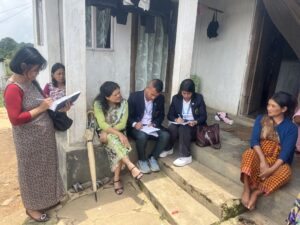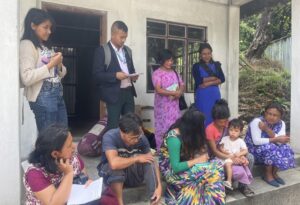Mawbeh Village, Laitkroh Block, East Khasi Hills | 23 March 2025
As part of the Human Development Leadership Programme (HDLP), newly inducted MCS Officers undertook a field immersion in Mawbeh Village, interacting directly with households to better understand the lived realities of service delivery, inclusion, and social welfare on the ground.
With a population of 791 across 146 households, Mawbeh reflects both the challenges and potential of rural Meghalaya. The visit began with a community meeting chaired by the BDO and attended by sectoral officials and village institution representatives. Core grievances raised included poor road connectivity, disrupted water supply due to construction, low Aadhaar enrolment, dropout rates after primary school, resistance to immunisation, and scattered settlement patterns affecting ICDS access.

Field Interactions: Stories of Challenge, Resilience & Possibility
Across 8 households, a complex tapestry of issues emerged—from mental health to maternal care, from dropout prevention to disability support.
- In one poignant case, a mother suffering from postpartum depression and a history of seizures was receiving treatment from Sanker and MIMHANS, while her children took on caregiving duties. The family, despite receiving housing under PMAY-G, was visibly in distress—underscoring the need for integrated mental health, livelihood, and social support.
- Another household presented a case of high-risk pregnancy, where the mother, despite past child loss, was fully vaccinated, enrolled in schemes, and actively participating in SHGs. However, she had to travel far for ultrasounds due to non-functional equipment at the local PHC—a timely reminder to prioritise operational readiness alongside infrastructure.
- In contrast, the household of Sngewbha Khongwar, a graduate and mother of four, emerged as a model of how education, health services, SHG participation, and strong maternal leadership can converge for community well-being. Her children were in school, vaccinated, and supported through ICDS, while she herself took charge of their learning. Her only concern: the lack of a door in the girls’ school toilet—a simple, fixable issue with outsized implications for dignity.
- Some households reflected the persistent impact of Aadhaar hesitancy, resulting in complete exclusion from welfare schemes. In one case, none of the 10 family members had Aadhaar or were enrolled in MHIS, SHG, or education support.
- Cases of school dropout, adolescent girls with unaddressed aspirations, and children with disabilities were also observed. Encouragingly, these visits opened immediate pathways—referrals to CMYC centres, disability schemes, and education re-engagement plans.

Emerging Themes:
- Health Services are Reaching, but access remains uneven due to terrain, social beliefs, and gaps in last-mile follow-up.
- Aadhaar remains a critical enabler, yet social resistance and misinformation continue to exclude many.
- Women’s groups (SHGs) are proving essential platforms, though underutilised by some due to caregiving burdens or prior negative experiences.
- Mental health and disability cases require structured follow-up, financial support, and system-level sensitivity.
- Positive Deviance Exists—households like Sngewbha’s show what’s possible when public services meet community readiness.
The Way Forward:
The field visit to Mawbeh has reaffirmed the need for hyper-localised interventions that go beyond scheme rollout to focus on trust, awareness, and dignity. It also highlights the power of dialogue: when government listens, people speak. And often, they know exactly what they need.
As one village headman expressed during the interaction, “It gives us motivation when officers visit our homes. We feel heard and seen.”
These lessons from the field must now translate into responsive governance—where every mother, student, and child in Meghalaya feels the same.